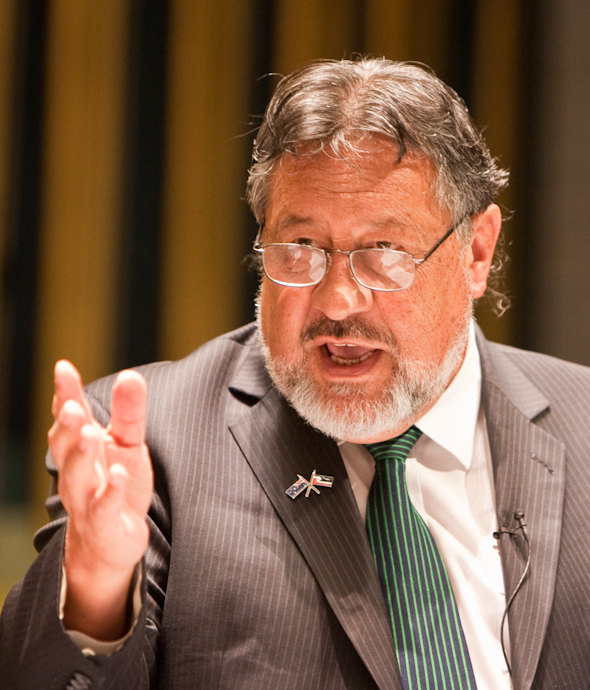With Craig and the Conservative Party in the news recently, I’ve been searching for clues to their approach and opinion on Maori issues. Yesterday I stumbled on
this interview Craig gave with Claudette Hauiti from Waatea Radio. The interview is one of the more in-depth and instructive that Craig has given and, arguably, indicates that Craig is pragmatic when it comes to things Maori.
I initially expected Craig and the Conservative Party to be openly hostile on Maori issues. Given the segment of the electorate Craig is targeting, I thought anti-Maori sentiment would be a given. Take, as one example,
this pamphlet the Conservative produced last year. The pamphlet explains “why National is wrong on the foreshore and seabed” and proceeds to attack the Maori seats, The UN Declaration on the Rights of Indigenous People and treaty settlements.
However, in contrast with the above pamphlet, Craig took a more pragmatic approach to Maori issues on Waatea. Much of the interview consisted of, for want of a better term, cuddly responses from Craig. For example, when describing his time in the Maori department at AUT, Craig reckoned that “everyone was everyone’s friend” and it was “a wonderful experience for me”. Thankfully, however, Hauiti managed to pry some very instructive answers from Craig.
On education, Craig supports Kura Kaupapa and Kohanga Reo saying that we need a “variety of educational institutions” and “schools should have the freedom to do what works”. Although this position clashes with the Conservative Party’s opposition to policies that “
divide us based on race”, for example the Maori seats, it indicates a pragmatic approach to Maori issues. Kura and Kohanga work, that’s undisputed, and it is encouraging to know that Craig supports what works. It would be easy, and perhaps politically expedient, for Craig to oppose Kura and Kohanga on ideological grounds.
If anything, the above indicates that Craig’s ideology is flexible and that, for a politician at least, is an asset.
Hauiti also asked Craig whether he thought, and I’m paraphrasing here, Maori held the key to their own destiny. In other words, does he support Maori self-determination (tino rangatiratanga). At first, Craig didn’t recognise what was implicit in the question. When the question was put to him for a second and third time, he didn’t give a straight answer. Actually, Craig’s answer was contradictory. At first he started speaking about individual responsibility, which I read as meaning that the individual has the key to their own destiny rather than Maori as a collective, but then Craig went on to endorse Maori organisations and their efforts in Maori development which seemed to indicate that he does endorse Maori formulating solutions for Maori. I find it difficult to reconcile those two positions.
Interestingly, Craig thinks the Foreshore and Seabed Act 2004 was wrong and that every New Zealander should have “the right to go to Court on an issue”. However, Craig is opposed to Maori customary title holding the foreshore and seabed should be held in the commons, read owned by all New Zealanders. However, Craig endorsed customary rights to fishing, usage and so on. Again, this is a contradictory position. It recognises that Maori have special rights, for example fishing rights, however the Conservative Party's position is that everyone has the same rights. Again, this indicates a degree of pragmatism on Craig’s part. Perhaps aware that the party will have to rely on and, if elected to Parliament, work with Maori, Craig is attempting to find positions that will satisfy his target market and at the same time provide a base for working with Maori politicians.
On the question of how well the Conservatives will represent Maori, Craig reckons “very well” and says that for “New Zealand to succeed we need Maori to succeed”. If you had to attribute that comment to someone, you’d probably pick Hone Harawira before Colin Craig. In another moment that could have come from Hone Harawira or Tariana Turia, Craig claims not to put much faith in the free market. On the subject of Maori unemployment, Craig does not believe “the free market is going to sort everything out”. Instead, Craig believes in creating initiatives “that work” (what works is a common thread throughout the interview) and he does not want people “forced into situations where they have to put their hand out”.
At the end of the interview Craig says he supports Whanau Ora, but before he can qualify/explain that answer he was cut off. Again, this may indicate an openness to what works, but we can’t know for certain without a more wholesome answer.
In all, it was an interesting interview. I don’t necessarily agree with Craig’s positions, but he appears open to Maori ideas – or at least not openly hostile. This could, of course, change with time and change in response to shifting political circumstances. But, for the moment, Craig poses no threat to Maori progress.
*Just a reminder I'm on Twitter now. You can follow me here.
